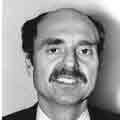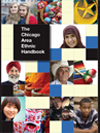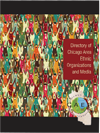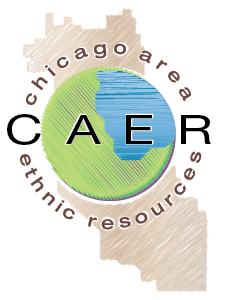-
Between two worlds
by Alexander Rimas Domanskis

Throughout life we choose what we do as individuals and as members of a community. In Chicago, I live in the broader metropolitan community and in the vibrant Lithuanian American community as well. Raised by parents who immigrated to the United States several years before I was born, I was faced with the questions many others face — what is my place in America and do I accept or reject my ethnic roots? I have embraced both, but find myself not fully part of either. I am between two worlds.
Today I live in Western Springs with my Lithuanian American wife (whom I met at a Lithuanian Club meeting at the University of Michigan) and two children. We belong to two Catholic communities, one at the Lithuanian World Center in Lemont, where our children attend Lithuanian Saturday School, and one in Western Springs, where they are in elementary school.
We speak Lithuanian and English at home. My wife, as a psychologist, and I, as an attorney, use our Lithuanian language skills in our practices, though our clients cover a wide spectrum of American society.
I was born in 1952 on the West Side into a world of post-World War II Lithuanian refugees. Then as today, metropolitan Chicago had the most residents of Lithuanian descent of any place outside Lithuania. Since the first Lithuanians arrived in Chicago in the 1800s, many have assimilated, intermarried and could be called part of the “melting pot.” Those who are most active today in the Lithuanian community tend to be from families who came after WWII.
My parents and older brother arrived in 1948 from post-war Germany where they were displaced persons, having fled the occupation of Lithuania by Stalinʼs Soviet Union. Similar to Hitlerʼs deportation to prison camps and killing of many Jews and other East Europeans, Stalinʼs reign of terror resulted in deportations to Siberia and deaths even exceeding those caused by Hitler. Over 30 percent of Lithuaniaʼs population was deported, fled or was killed during WWII. I doubt any Lithuanian American family was spared. My father and his family were on deportation lists for Siberia. Other family members were deported, and my great grandmother is buried somewhere in Siberia.
Like most other immigrants, my parents came to this country with nothing but their hopes, fears and willingness to do anything to improve their lives. My father, a mechanical engineer, worked with heavy metals and machinery at the Sunbeam factory. My mother, a physician, moved from late-night short-order cook and waitress at White Castle at Division and Western to laboratory jobs. Weeks after I was born, she took and passed the foreign medical licensing exam and became the first woman and first foreign medical graduate to complete an internship at Presbyterian (now St. Lukeʼs) Hospital. She later developed a practice in ophthalmology. Several years after I was born, my father secured a mechanical engineering position. Thus I experienced little of the difficult immigrant experience or economic struggles my parents and brother had.
I have always been proud I am American-born. As a child I would dream of being either president or pope; but only Italians were popes then, so I had a better chance of being president.
And because a fervent hope for an independent Lithuania permeated the Lithuanian American community, I daydreamed about leading the liberation of Lithuania, after reading about American revolutionary guerrilla war leaders. I pulled out maps and plotted how to infiltrate behind Soviet lines.
Growing up in a predominantly Irish Catholic parish, I was the only child who spoke Lithuanian — and one of only a few who spoke any foreign language. I was proud, independent and sometimes lonely. When the Irish in my school were allowed to go out of uniform and wear green on St. Patrickʼs Day, I took the liberty of wearing Lithuanian colors on St. Casimirʼs Day. My teacher told me to remove the colors, but I convinced her I was entitled to wear them. I bonded with the rare foreign child who came through our school — the Mexican American blind boy and the Yugoslavian immigrant, who were my best friends in third and fifth grades, respectively.
The Lithuanian American community today maintains the parallel societal structures I grew up with. I attended Lithuanian Saturday School and Lithuanian scout and religious camps. We spent many a summer day at Lithuanian resorts along Lake Michigan. We attended Lithuanian opera, folk dance and folk song festivals. Many of my generation grew up so immersed in Lithuanian American society that they chose either to remain totally immersed or to minimize their ethnic heritage. I have chosen to be part of both American and Lithuanian American society.
During the 1950s and ʻ60s, contact with my fatherʼs brother and parents in Lithuania was nonexistent. In those Cold War years and continuing in the 1970s, any contact was spied upon. After my visits with relatives in Poland in 1966 and Lithuania in 1971 and ʻ74, I felt a stronger personal bond with my Lithuanian heritage.
In 1988 I joined with others to purchase the former DeAndreis Seminary in Lemont to establish the Lithuanian World Center, for which I became the first president. At the same time, Lithuania was experiencing breakthroughs in its struggle for independence.
The near-impossible dream of restored freedom began to take shape, with the Lithuanian World Center becoming a meeting ground and support center. In the autumn of 1988 we hosted the International Lithuanian Symposium of Arts and Sciences, which for the first time included a sizable contingent from Lithuania, including Vytautas Landsbergis, soon to become the first president of the restored nation. In 1989 during the Soviet Unionʼs economic blockade, we organized to coordinate political action. Our children started political protesting early.
In 1989, I began taking yearly trips to Lithuania. They were exhilarating and cathartic because I felt I was part of the rare moment in history when a nation regains its freedom. Many Lithuanian Americans shared this exhilaration, which gave meaning to all we had done to keep our heritage alive. When Lithuaniaʼs independence was fully restored in 1990, we were overwhelmed that little Lithuania had stood up to the Soviet Union and regained its independence. And we felt part of that struggle.
Alexander Domanskis is an attorney in Chicago.
Return to Links & Features
Available Now!
The
Chicago Area Ethnic
HandbookEasy-to-use chapters on the histories and traditions of
37 ethnic groups.
Second Edition
UPDATED and EXPANDED!

The Directory
of Chicago Area Ethnic Organizations
and Media Who they are, what they do and how to reach them.
Third Edition



